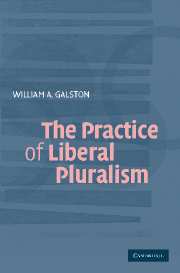Book contents
- Frontmatter
- Contents
- Acknowledgments
- 1 Introduction
- PART I PHILOSOPHICAL FOUNDATIONS OF LIBERAL PLURALISM
- PART II LIBERAL PLURALISM AND PUBLIC ACTION
- PART III POLITICS, MARKETS, AND CIVIC LIFE IN LIBERAL PLURALIST SOCIETIES
- PART IV DEFENDING LIBERAL PLURALISM
- 10 Liberal Pluralism and Liberal Egalitarianism
- 11 Liberal Pluralism Between Monism and Diversity
- 12 Conclusion: Liberal Pluralism at Home and Abroad
- Index
12 - Conclusion: Liberal Pluralism at Home and Abroad
Published online by Cambridge University Press: 18 December 2009
- Frontmatter
- Contents
- Acknowledgments
- 1 Introduction
- PART I PHILOSOPHICAL FOUNDATIONS OF LIBERAL PLURALISM
- PART II LIBERAL PLURALISM AND PUBLIC ACTION
- PART III POLITICS, MARKETS, AND CIVIC LIFE IN LIBERAL PLURALIST SOCIETIES
- PART IV DEFENDING LIBERAL PLURALISM
- 10 Liberal Pluralism and Liberal Egalitarianism
- 11 Liberal Pluralism Between Monism and Diversity
- 12 Conclusion: Liberal Pluralism at Home and Abroad
- Index
Summary
In an intellectual and political context reshaped by the events of September 11, 2001, it is necessary to state, as far as possible, the implications of liberal pluralism for the conduct of international as well as domestic affairs. As I have argued elsewhere, liberal pluralism stands opposed to the liberal triumphalism that enjoyed a vogue in the immediate wake of the fall of the Berlin Wall and the collapse of the Soviet Union. John Gray and other critics of liberal excess are right to emphasize the need for political flexibility and to suggest that differences of national history, culture, and circumstances should shape judgments about what specific political communities should do, here and now. Value pluralism distinguishes between the multiplicity of goods, on the one hand, and the great, undoubted evils of the human condition, on the other. To the extent that the international politics of liberal pluralism has a common core, it consists in the effort to ameliorate these evils and to work for their eventual eradication. Liberal pluralist internationalism overlaps with the international human rights movement and with some (though not all) of the specific measures set forth in the International Covenants on Civil and Political Rights and on Economic, Social, and Cultural Rights.
Even in this domain, pluralism affects political judgments and strategies by sensitizing us to the possibility that in dire circumstances, even the most basic constituents of decent human lives may come into conflict. We may not be able to move against all the great evils of the human condition at the same time or with equal vigor.
- Type
- Chapter
- Information
- The Practice of Liberal Pluralism , pp. 197 - 200Publisher: Cambridge University PressPrint publication year: 2004



